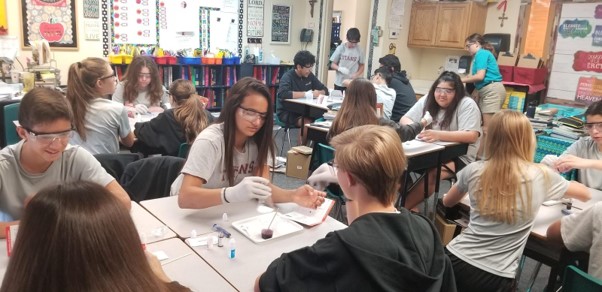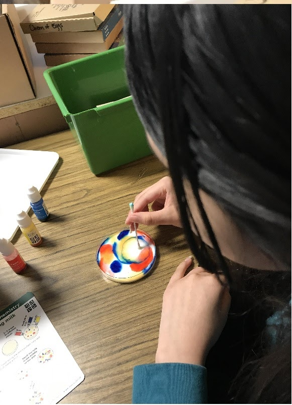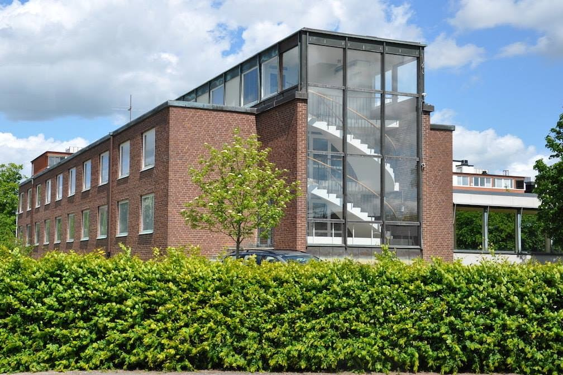Here goes! Looking for a quantum chemist
Finally! The company has been registered, a temporary office rented, now it’s time to start looking for people! First of all, I am looking for a quantum chemist in Saint Petersburg. As a bonus, I am sharing an awesome question about laundry and frost.
Today’s view from the office window is great:

When I was a child, I thought I would become a scientist when I grew up. However, my discontent about politics in science and the unique, dizzying feeling of creating something new (in science, you discover something that’s been there for ages without you) made me opt for programming. Fourteen years ago, we founded SPB Software and stating developing mobile applications to eventually become #1 on the market of applications for Windows Mobile. Seven years ago, we turned an emerging mobile TV business into a standalone company, and today, SPB TV is one of the leading experts in this area. After that, Yandex acquired SPB Software and I became a Yandex employee. I will be honest: Yandex is one the best places to work at in the entire world!
Back to science
Some time ago, I decided to return to science or, to be precise, to education. The expansion of human knowledge over the last 50-100 years is absolutely amazing. According to modern criteria, biology, as a science, didn’t exist just 70 years ago. When I was a boy, you could easily live knowing nothing about computers, and today, they are even more important than foreign languages. We have made incredible headway in physics. And it’s education that is lagging behind.
The way physics, chemistry and biology are taught now hasn’t changed much over the past 50 years. If we don’t focus on compacting the available knowledge, don’t learn to pass it to future generations a lot more efficient than we do today, we will find ourselves in a situation where schools will start producing specialists with a very narrow scope of professional competence. And this is very bad. It hinders progress, since many discoveries are made in border areas between different sciences and disciplines. I am a father of four sons, and I do not wish them such a future. So how can we pass our knowledge in a more compact form?
I remember being taught what a cell consists of. And then, many years after, I saw thing video (watch it, it’s a masterpiece):
This one video explained more to me than a half a year in my biology class. Tomorrow, I will try to explain how to transfer scientific knowledge in a more compact way. Let’s get back to vacancies now.
Who I am looking for
Well, I am looking for three people now:
- Quantum chemist with solid development skills
- 3D designer
- A dev lead with knowledge of physics and chemistry
Today, I will describe the type of chemist I am looking for. Tomorrow’s post will be about a 3D designer, and the next one – about a dev lead.
Quantum chemist with solid development skills
Who I am looking for: a natural born chemist. Someone who’s in love with chemistry, someone who reads chemistry books, who can’t help mixing stuff in the garage to prove some ideas. And at the same time, this person knows chemistry deeply, not superficially, on an amateur level. This person can, if necessary, go all the way down to quantum physics and understand (calculate, program) effects and reactions on this level. Apart from chemistry and quantum physics, this person should be a good developer capable of numerically programming calculations. In other words, be a natural with computers.
The first task will be to emulate and visualize non-organic chemical reactions. The work will be done in two major areas:
- Visualization: we’ll need to come up with a way of demonstrating molecular interaction. Everything that the human kind has created so far, is unsatisfactory. We’ll need to start from scratch. We’ll need to work with the 3D designer to create visual models for electron orbits, energies, electron transitions, excited states and so on.
- Emulation: although it is yet impossible to accurately (ab initio) calculate the quantum-mechanical mechanisms of most reactions, we need to create a pseudo-empirical algorithm suitable for a broad range of reactions. Keeping in mind that it will need to expand for “honest” quantum-mechanical calculations in the future without any interface changes, I am sure that we should be able to calculate most reactions ab initio in just 5-10 years.
Once I have the first prototype of reaction emulation and visualization, we will need to work on the contents of the chemistry set: what substances and equipment it should contain, how experiments should be described, how new equipment should be created, etc.
This work will require deep knowledge in chemistry, experience in calculating energies using quantum chemistry methods, good knowledge of quantum physics and experience in C++ or Java. Since some team members will be in London, it is important that written and spoken communications are not a problem.
Conditions:
- 120,000-150,000 rub per month, depending on development skills
- No moonlighting, it must be the main and the only job
- Work at the office, south-western part of the city (temporarily, will be moving out this fall)
- Vacation - 1 month
- Health insurance
- Unlimited budget for books
Our office also has some interesting things: a microscope, a jack-plane, a 3D printer and a smoke generator ;) More on how we are going to work – tomorrow or in a day.
Apply to the position of a quantum chemist and send your resume
Bonus task about laundry
It’s a well-known fact fact that wet laundry dries up at subzero temperatures. The question is why? To make things more interesting, ask yourself: why doesn’t a spoon evaporate? What about the table? But ice does. How? What’s the difference?
See also

CASE STUDY - 8th Grade students at St Timothy's Catholic School use MEL Chemistry to enhance their science lessons
Saint Timothy Catholic School in Mesa is committed to promoting academic excellence in each child it looks after. They encourage self-discipline, self-respect, and respect for others. They understand the importance of engaging students in a comprehensive and relevant curriculum. As a result, the middle school science teacher from St. Timothy Catholic School is using MEL Chemistry subscriptions to enhance and expand their range of learning activities.

CASE STUDY - MEL Chemistry allowing pupils to reach their full potential
The Empower Learning Center is the Alternative Learning Program (ALP) within the Hinckley-Finlayson School District. They offer non-traditional education options for students ages 16-21 in their daytime program, night school for traditional high school students who need to make up credits, and night school for adults 18 and older who would like to complete their diploma or equivalency.
The school was seeking engaging, hands-on chemistry kits to make their science classes more interactive, and to help their students understand key science concepts and achieve their full potential in chemistry.

CASE STUDY - MEL Chemistry at Lund International School, Sweden
Emma Taylor, a science teacher at Lund International School (Sweden), has chosen MEL Chemistry sets as the best option for her students’ science classes. In Lund International School, all programmes are taught in English, and having chemistry sets in English are a great asset to accompany science classes.
Here, Emma shares her experience of how MEL Chemistry sets improved her students’ comprehension and understanding of science concepts.
